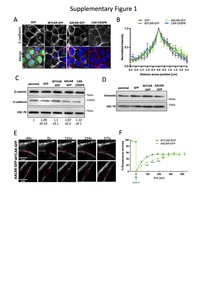Owczarek, C; Ortiz-Zapater, E; Kim, J; Papaevangelou, E; Santis, G; Parsons, M
(2022)
CAR Co-Operates With Integrins to Promote Lung Cancer Cell Adhesion and Invasion.
Front Oncol, 12.
p. 829313.
ISSN 2234-943X
https://doi.org/10.3389/fonc.2022.829313
SGUL Authors: Papaevangelou, Efthymia
Abstract
The coxsackie and adenovirus receptor (CAR) is a member of the junctional adhesion molecule (JAM) family of adhesion receptors and is localised to epithelial cell tight and adherens junctions. CAR has been shown to be highly expressed in lung cancer where it is proposed to promote tumor growth and regulate epithelial mesenchymal transition (EMT), however the potential role of CAR in lung cancer metastasis remains poorly understood. To better understand the role of this receptor in tumor progression, we manipulated CAR expression in both epithelial-like and mesenchymal-like lung cancer cells. In both cases, CAR overexpression promoted tumor growth in vivo in immunocompetent mice and increased cell adhesion in the lung after intravenous injection without altering the EMT properties of each cell line. Overexpression of WTCAR resulted in increased invasion in 3D models and enhanced β1 integrin activity in both cell lines, and this was dependent on phosphorylation of the CAR cytoplasmic tail. Furthermore, phosphorylation of CAR was enhanced by substrate stiffness in vitro, and CAR expression increased at the boundary of solid tumors in vivo. Moreover, CAR formed a complex with the focal adhesion proteins Src, Focal Adhesion Kinase (FAK) and paxillin and promoted activation of the Guanine Triphosphate (GTP)-ase Ras-related Protein 1 (Rap1), which in turn mediated enhanced integrin activation. Taken together, our data demonstrate that CAR contributes to lung cancer metastasis via promotion of cell-matrix adhesion, providing new insight into co-operation between cell-cell and cell-matrix proteins that regulate different steps of tumorigenesis.
| Item Type: |
Article
|
| Additional Information: |
Copyright © 2022 Owczarek, Ortiz-Zapater, Kim, Papaevangelou, Santis and Parsons. This is an open-access article distributed under the terms of the Creative Commons Attribution License (CC BY). The use, distribution or reproduction in other forums is permitted, provided the original author(s) and the copyright owner(s) are credited and that the original publication in this journal is cited, in accordance with accepted academic practice. No use, distribution or reproduction is permitted which does not comply with these terms. |
| Keywords: |
cell-cell adhesion, cell-matrix adhesion, coxsackievirus adenovirus receptor (CAR), integrins, invasion, lung cancer |
| SGUL Research Institute / Research Centre: |
Academic Structure > Institute of Medical & Biomedical Education (IMBE) |
| Journal or Publication Title: |
Front Oncol |
| ISSN: |
2234-943X |
| Language: |
eng |
| Dates: |
| Date | Event |
|---|
| 14 February 2022 | Published | | 19 January 2022 | Accepted |
|
| Publisher License: |
Creative Commons: Attribution 4.0 |
| Projects: |
|
| PubMed ID: |
35252000 |
 |
Go to PubMed abstract |
| URI: |
https://openaccess.sgul.ac.uk/id/eprint/114193 |
| Publisher's version: |
https://doi.org/10.3389/fonc.2022.829313 |
Statistics
Item downloaded times since 17 Mar 2022.
Actions (login required)
 |
Edit Item |
![[img]](https://openaccess.sgul.ac.uk/114193/8.hassmallThumbnailVersion/Image_1_CARCoOperatesWithIntegrinstoPromoteLungCancerCellAdhesionandInvasion.jpeg)




